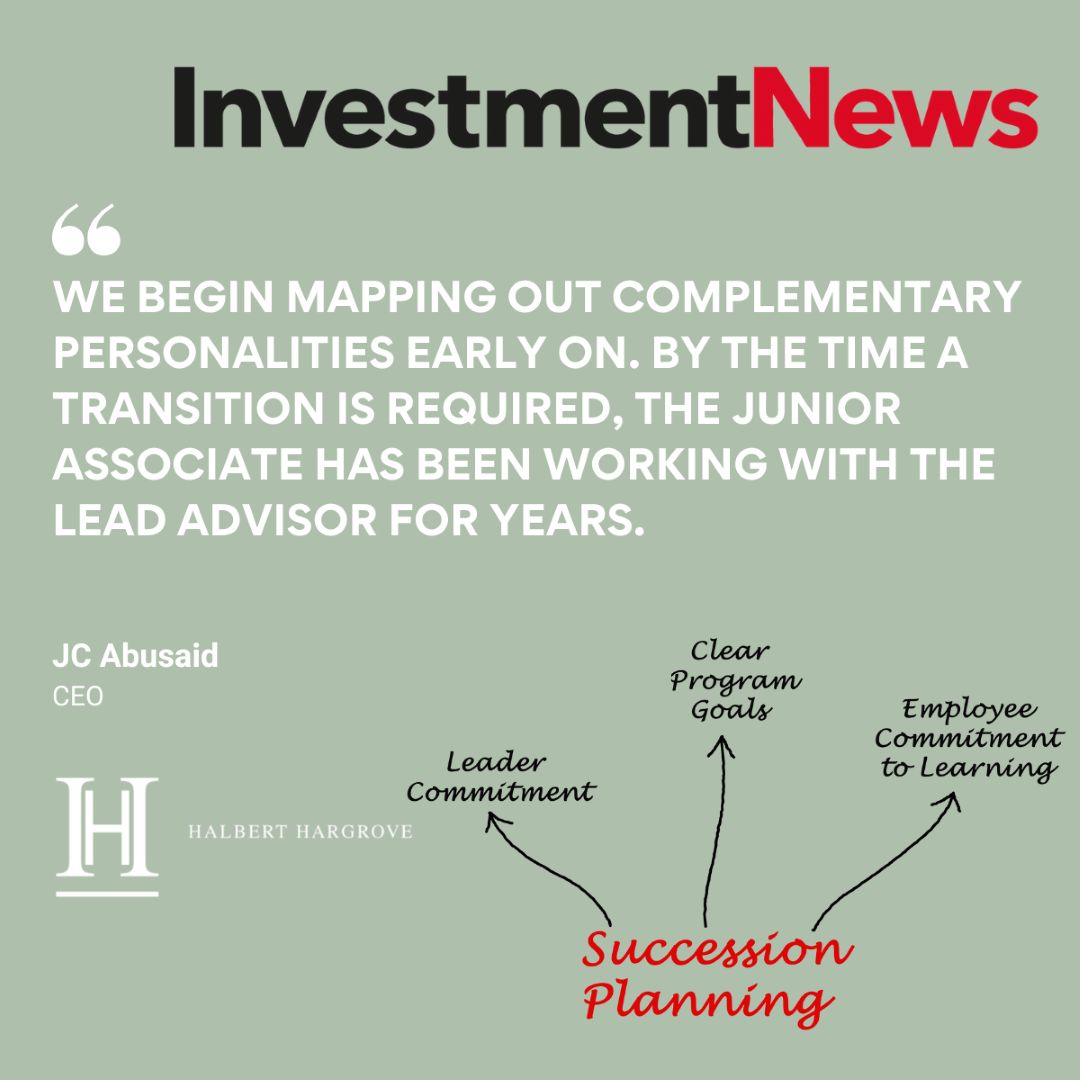By Josh Welsh, InvestmentNews, featuring JC Abusaid, CEO/President and Shane Cummings, CFP®, AIF®, Wealth Advisor & Director of Technology/Cybersecurity
DeVoe & Company survey suggests RIAs will have their work cut out for them around talent management. What should RIAs be focused on?
For an industry that is passionate about client service, a report finds talent at RIAs aren’t being treated in the same vein.
Even though most wealth management firms know their staff is a main factor of client happiness, RIAs will have their work cut out for them around human capital, a report released by DeVoe and Company found.
The report found some alarming setbacks for RIAs. Succession planning has taken a significant turn for the worse, with only 42 percent of firms have written succession plans, a record low, according to DeVoe, since tracking began in 2019.
Meanwhile, many firms don’t have second or third-generation candidates who could step into senior roles if a transition happened today, with one in three firms admitting that leadership transitions would be “bumpy at best,” indicating a lack of next-gen readiness.
There are already several firms that are prioritizing succession plans with a focus on next gen, while others are focused on ownership.
Working with FP Transitions, Searcy Financial implemented a multi-stage succession plan that started with minority ownership transfers, eventually expanding to include multiple owners, said Marc Shaffer, CFO and principal at Searcy Financial, in an email.
“In 2021, we completed the transition through a strategic partnership with Skyview, enabling a complete ownership transfer while retaining our founder’s expertise during a three-year transition period,” he said.
To support this expansion, Searcy recently hired a COO who’s implementing strategies for the firm, including a new variable compensation structure that aligns team success with firm performance.
“Our experience shows that with proper planning, expert guidance, and commitment to developing next-generation talent, firms can successfully navigate succession while creating opportunities for substantial growth and enhanced team engagement,” he added.
RIAs might also consider teaming up with their respective third-party broker dealer or hybrid RIA to form and adopt joint practice agreements, said Michael Cocco, managing partner at Beacon Wealth Partners, in alliance with Equitable Advisors.
Such agreements ensure seamless transitions for clients in the event an advisor becomes unavailable, he said.
“It’s not a revenue-producing activity, but it’s critical for the continuity of service to our clients. We owe it to our clients, if no one else, to make sure we have something in place,” he said.
Beyond succession planning, there are broader concerns, such as only half of firms articulating clear career paths, according to the report. Yet, retention rates are a bright spot, with 84 percent of firms reporting low or no undesired attrition.
Cocco pointed to mentorship and shared culture as tools to combat these challenges.
“When I started out in college, I was getting a ton of help,” he said.
Now, he actively gives back, mentoring new advisors and sharing best practices.
“The culture that Equitable has created is great. You never feel for a minute that you’re at this alone,” he said.
“It’s important for next-gen advisors to gain clarity about their career path at advisory firms,” said Leah Sciabarrasi, president and managing partner at Crestwood Advisors, in an email.
“Engaging in dialogue and offering transparency around perceived future firm opportunities and challenges helps advisors gain perspective about the opportunity to both ensure excellence and consistency for clients as well as grow their own careers,” she said.
The report also highlighted a negative net promoter score of -30 percent for incentive compensation plans, signaling dissatisfaction among advisors, a reflection of Schwab’s recent Compensation 2024 RIA Report.
Schwab asserted having an employee value proposition (EVP) could help with compensation plans.
“Our employee value proposition starts with our mission and values, is centered on culture, and is reinforced by our total reward programs. Additionally, as a growing and dynamic organization, career growth is another key component of our EVP,” said Elizabeth Hioe, chief people officer at Mercer Advisors.
Employees have opportunities to grow in their current roles, advance in level, stature and scope, and pivot their focus to learn different parts of the business, she explained, while noting over a third of Mercer colleagues were promoted or changed their roles in “a meaningful way.”
For firms to create a better career path, DeVoe suggested designing a solid path around compensation and benefits, being transparent, make time for current employees, consider an external sale and introduce formal coaching programs.
While management plays a role, mentoring is critical for smoothing things out, said JC Abusaid, CEO and president at Halbert Hargrove, in an email.
“We also begin mapping out complementary personalities early on. By the time a transition is required, the junior associate has been working with the lead advisor for years. Careful management and strategic allocation of associates come with the territory,” he said.
Halbert Hargrove is already employee owned, with part of their succession plan putting employee ownership in place, said Shane Cummings, wealth advisor and director of technology and cybersecurity at Halbert Hargrove.
“Sporadically over time, they’ve been transitioning some of the ownership to associates. That’s an important step,” he said.
“It’s in our business continuity plan, which I just reviewed recently. It spells out that if anything happens to the first, second and third people in line, they assume that responsibility and is a successor. It’s been really fleshed out.”
Cummings attributed firms’ struggles to short-term thinking, particularly among those prioritizing mergers and acquisitions over employee development, which could suggest the lack of internal planning.
“If other RIAs are more focused on just M&A, I could see where they might not be as focused on succession planning,” he said.


